Today, in our lab, we are going to abuse a very popular gadget: the Apple iPhone 4. This smartphone is equipped with a LED-backlit TFT LCD capacitive multi-touch screen. The screen has excellent visual transparency of 90%. (To compare, the visual transparency of most resistive touchscreens of cell phones is only 75%). The Apple iPhone 4 proximity sensor is very sensitive. It is sensitive even to the slightest touch. The smartphone has a 3.5-inch (measured diagonally) wide-screen display with 960-by-640-pixels and a resolution of 326 ppi. That’s one of the highest resolutions available in the smartphone market. Like other topnotch LCDs, the iPhone 4 LCD follows the IPS matrix.
All devices produced by «Apple» are considered brilliant, but the iPhone 4 stands out like a sore thumb. Everything about this smartphone is smart, including its own package box (pic. 1). The package box is only slightly bigger that the gadget itself but it is made of a high quality and strong material. In the package, you’ll find the following:
- Apple Earphones with Remote and Mic
- USB Cable
- Battery charger
- A paper clip to remove the SIM card
- Documentation
Don’t be fooled by the iPhone 4’s simple design; this gadget is a stealthy one. It’s a bit more flat and slimmer than the previous iPhone models. It also feels very sturdy (pic. 3, 4). Just before the stress test, we feared that the display would not be able to stand up to the knocks and bumps since it is not protected by a steel band. Read further to know all the results.

Pic. 1. The delivery box
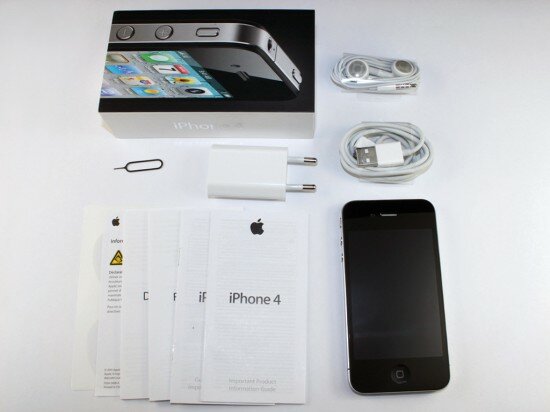
Pic. 2. Accessories
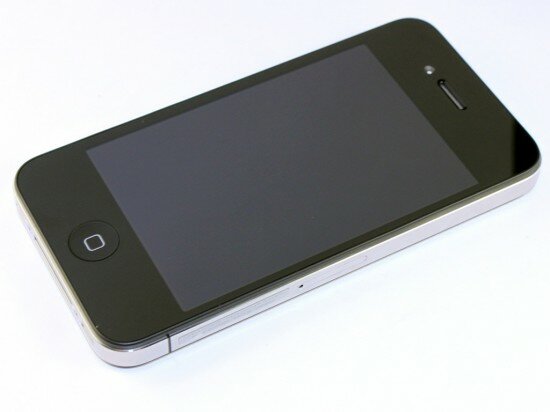
Pic.3. Front side
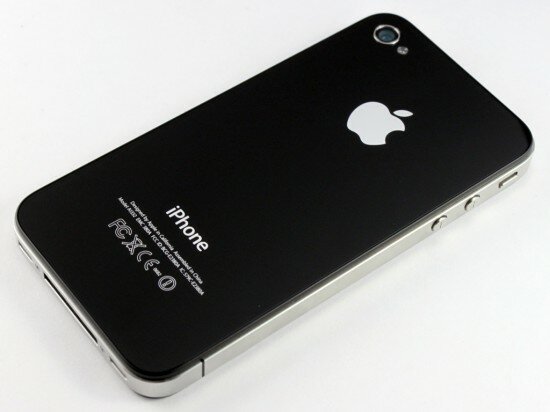
Pic. 4. Back side
1. Apple iPhone 4 stress test. Stage 1 – Light shocks
1.1 Drop test
The iPhone 4 is made of metal (a stainless steel band runs around the edges) and chemically strengthened aluminosilicate glass (glazed plastic). Its size doesn’t really give much clue to its weight. These factors determine the impact of a fall. In order to know whether the device is strong enough to withstand bumps, we successively dropped it on the ceramic tiles (video 2) with each face, edge, and corner from 1 m (3,28 ft) on the carpet (video 1) and from 30 cm (11,8 inches).
The iPhone 4 passed this test very well. It showed no damage at all. The non-removable back panel is a great advantage of this gadget in comparison with other cell phones.
Video 1. Drop on the carpet from 1 m (3,2 ft)
The grade is 30 from 30 possible
Video 2. Drop on the tiles from 30 cm (11,8 inches)
The grade is 30 from 30 possible
1.2 Squeeze test
We do not want anybody stepping on his/her iPhone 4 or sitting down on it but these things do happen. In order to find out how the gadget fares after such situations, we placed it on a table and applied a 3 kg (66 lbs.) pressure from a wooden bar above it (pic. 5). We did not expect to see any crack on it because the iPhone 4 is flat — and we were right. The phone seems really solid. It successfully passed the squeeze test.

Pic. 5. The squeeze test
The grade is 24 from 24 possible
1.3 Bend test
During the bend test, the applied pressure is not distributed all over the handset. Instead, we focused it on a particular part of the phone. That’s how the bend test differs from the squeeze test. We put the iPhone 4 onto the two planks so that each edge of the phone lies on a single plank. Then we hitched a string with 1 kg load (2.2 lbs.) on top of the device. This test simulates a possible situation when a person lies down on a sofa or sits down on a chair with his/her iPhone 4 in the pants pocket. Based on picture 6, iPhone 4 sustained no sign of bend.
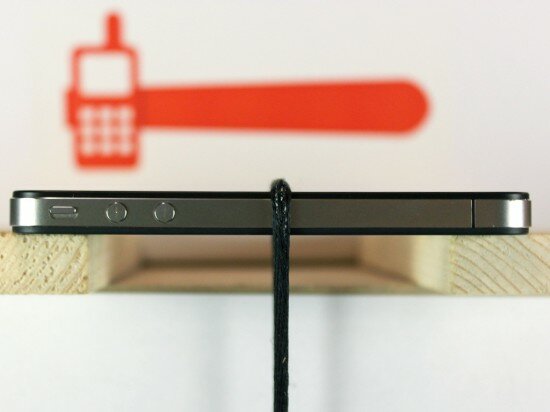
Pic. 6. Bend test
The grade is 24 from 24 possible
1.4 Durability
When we performed this test, Apple iPhone 4 had just arrived in the market. So no one has yet experienced using an iPhone 4 for a long period of time (i.e., everyday use). So we did something else: we placed the gadget inside a drum together with keys, pennies, and plastic balls to simulate what might be happening in a man’s pants pockets while carrying the phone. The drum was rotated for 5 minutes at the speed of 500 rpm. After the test, we examined the phone.
The screen was slightly damaged (pic. 7). We saw small scratches at the edges of the screen. There were fewer scratches at the central part of the screen (probably because the drum used was barrel-shaped). If the same happened inside a pocket, the damage would most likely be distributed all over the screen. The steel band running around the edges was also slightly damaged (pic. 8). However all this damage is visible only under bright lights. The display quality, however, remained perfect.
Actually, it is impossible for any phone to pass this test with no damage at all. We did not lower the grade for the iPhone 4 since it showed good results.
Video 3. Rotation of the drum
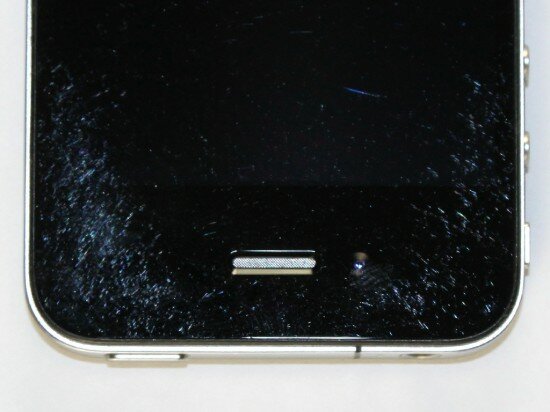
Pic. 7. Damage of the screen glass
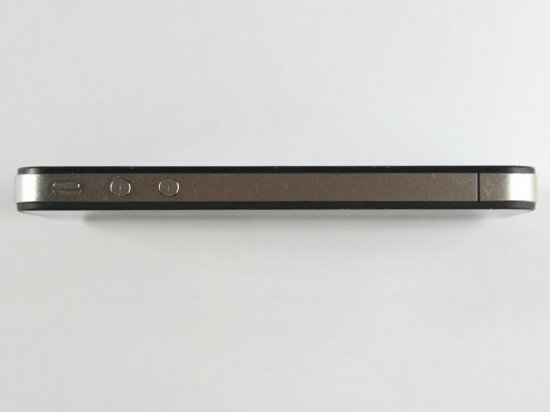
Pic. 8. Scratches on the steel band around the edges
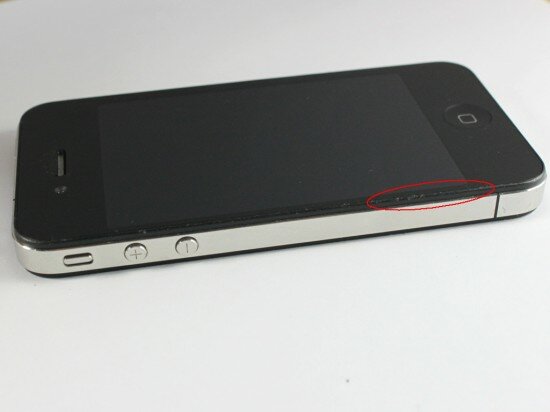
Pic. 9. Damage of the edges of the screen
The grade is 15 (with 15 being the highest possible grade)
1.5 Scratch test
In order to test the material of which the iPhone 4 is made, we scratched the screen and the back panel. Our machine that had been devised especially for this test scratched the screen and the back of the phone at the force of 100 g. (0.22 lbs) (video 4, 5). As you may see from the video, the iPhone 4 sustained no visible scratch.
Video 4. Screen scratching
The grade is 15 from 15 possible
Video 5. Scratching the back panel
The grade is 15 from 15 possible
1.6 High temperature
Before starting the mass production of any electronic gadget, the majority of manufacturers test their products under extreme conditions. If they find any weak point, they seek to improve it. Perhaps «Apple» engineers put an iPhone 4 in an oven and baked it in order to know how it operates after being exposed to high temperatures. We performed our own test by placing the device in a metallic container 5 cm. from the electric bulb (40 Wt). The bulb heated the phone for 3 min. (video 5). The gadget survived such test. The brightness and color quality of its display stayed excellent. We can infer that the iPhone 4 can resist high temperatures (video 6).
Video 6. High temperature test
The grade is 12 from 12 possible
1.7 Dust test
It’s not a secret that dust can spoil not only the look of a cell phone but also its display quality. If dust is able to penetrate the screen glass, the display quality will be diminished. But this is not the worst that dust can cause to a phone. Large grains of dust or sand can damage a charger jack too. It can also destroy the keys. The iPhone 4 has 5 keys. In order to check its dust resistance, we took an enclosed tray containing dust and threw the phone inside it. We made it vibrate viciously for 2 min. After the test, we examined the device. A lot of dust stuck to the front but it was easily removed by cleaning it (pic. 10).
Though both the ear-microphone jack and the charger jack were not covered during the test, we found little dust in them (pic. 11). The loudspeaker was full of dust but we managed to shake it out since the loudspeaker is not set very deep in the handset (pic. 12, 13). There was no dust in the Jet. The earphones worked with no problem at all. However the vibrate switch started to squeak. Fortunately, we were able to easily remedy this problem and got rid of the unpleasant noise quickly.

Pic. 10. The phone after the test

Pic. 11. Dust in the the ear-microphone jack and in the charger jack
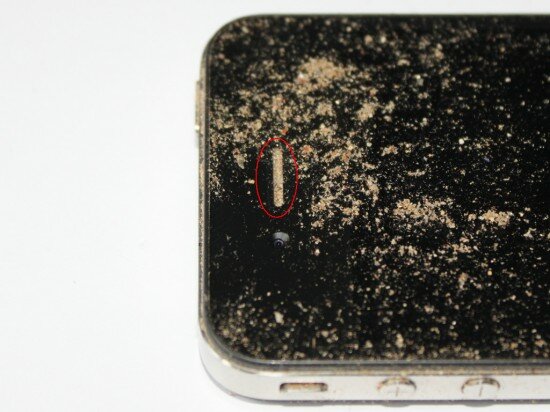
Pic. 12. The loudspeaker full of dust
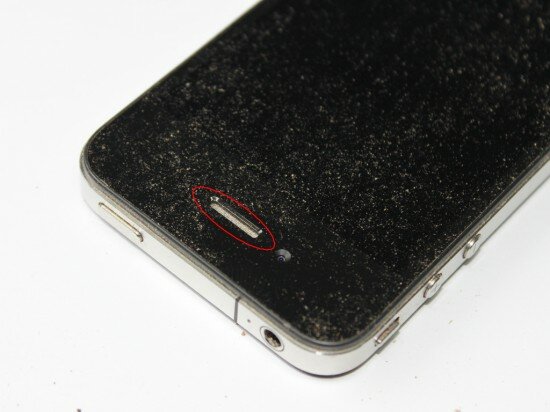
Pic. 13. The loudspeaker after cleaning
The grade is 12 from 12 possible
1.8 Connectivity
It has been announced that the Apple iPhone 4 had problems with its signal strength. The problem lies in its external antenna design. Its antenna is built into the stainless steel band that runs around the phone. One part of the band is responsible for GSM, while another is responsible for the Wi-Fi. The handset loses its signal reception when a person touches both antennas and produces short circuit. When the signal reception is good, a man’s fingers can serve as conductors. That was the official explanation given by Apple authorities.
But we carried out our own test. We placed the handset inside a box. Then we foiled the box (the foil served as a shield) and made a 40 x 45 mm (1,57 x 1,77 inches) hole in it. Then we made a call and found out that the signal reception fell only by 1 point (by 2 points at the end of the test). In general, the iPhone 4 received all incoming calls with no problem (video 7).
Video 7. Signal strength test
After the 1st stage of the stress test, the iPhone 4 got 192 (with 192 being the highest possible grade)
2. Apple iPhone 4 stress test. Stage 2 – Tough conditions
2.1 Drop test
We made this test tougher. The height of the drop on the carpet was 1,5 m (4,9 ft) and the height of the drop on the tiles was 50 cm (1,64 ft) (video 9). The result was the same as in the previous drop test: the iPhone 4 stayed functional. When we examined the phone carefully, we noticed some small scratches and cracks on the steel band (pic. 14). However, such damage is insignificant and is rather common for cell phones that are made of metal.
Video 8. Drop on the carpet from 1,5 m (4,9 ft)
Video 9. Drop on the tiles 50 cm (1,64 ft)
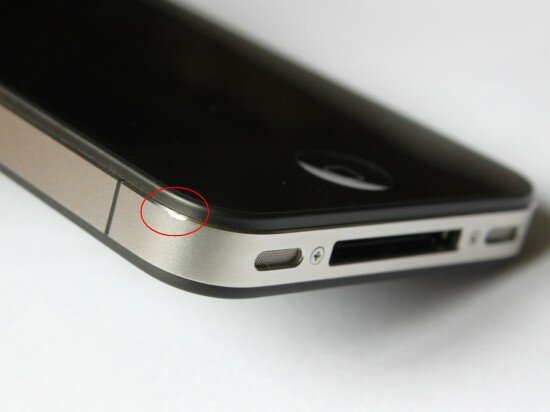
Pic. 14 Damage of the steel band
The grade for the drop on the carpet is 30 from possible 30
The grade for the drop on the tiles is 30 from possible 30
2.2 Squeeze test
In this test, we increased the applied pressure to 10 kg. (22 lbs). Just like the previous squeeze test, the iPhone 4 sustained no damage.
The grade is 24 (with 24 being the highest possible grade)
2.3 Bend test
This time, we increased the load by 5 times compared to the previous test. Nonetheless, 5 kg (11 lbs) was not enough to bend the iPhone 4. We found not even a 1 mm (0,039 inch) bend on the phone. The stainless steel band protected the device, leading to good results.
The grade is 24 (with 24 being the highest possible grade)
2.4 Durality
Cell phones with glazed faceplates usually do worse in this test than those with matted faceplates. We examined our glazed device after it had spent 10 min. in the rotating drum. We got the results as in the previous durability test.
As you may judge by picture 15, the screen got more scratches and cracks, but none was deep. When we looked at the iPhone 4 closer, we saw that the scratches did not spoil the quality of the display. The touchscreen was as good as before. But the test made a bad impact on the appearance of the phone. Neither the front side nor the back side was as attractive as it was before this test (pic. 16). The edges of the gadget and the metallic keys were also damaged (pic. 17, 18).

Pic. 15. Damage of the screen
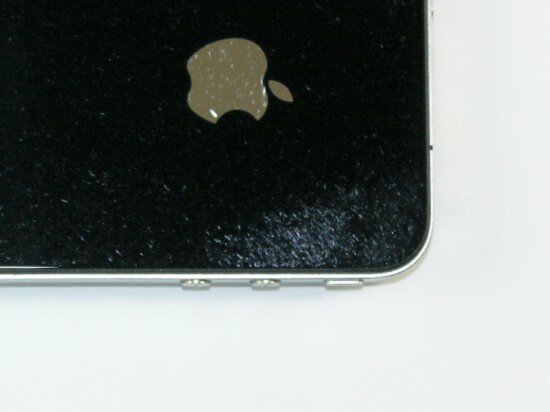
Pic. 16. Damage of the back panel
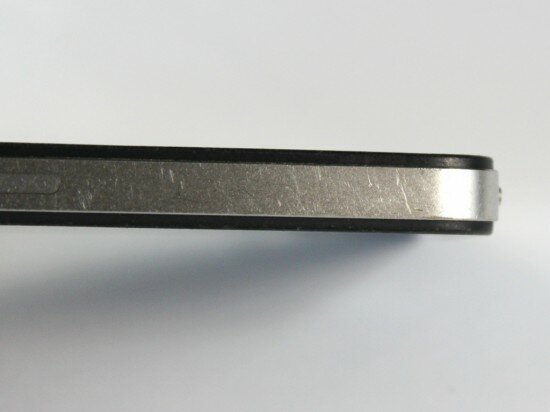
Pic. 17. Cracks at the edges

Pic. 18. Damage of the keys and the housing faceplate
The grade is 15 from 15 possible
2.5 Scratch test
This time, the machine scratched the iPhone 4 at the force of 300 g (0,66 lbs). The result was the same as in the previous scratch test. There was no sign of scratch on the screen or at the back. However, the iPhone 4 did not have a very good result in the tests that simulated the situation when a person carried the phone in his pants pocket for a long period of time.
The screen gets 15 points (with 15 being the highest possible grade)
The back cover gets 15 points (with 15 being the highest possible grade)
2.6 Freeze test
Extreme conditions include not only high temperature but also low temperatures. In freezing temperatures, cell phone batteries deplete quicker than usual (that is, their capacity goes down much faster compared to moderate temperatures). By the way, the screen may malfunction in cold weather. In order to check the performance of the iPhone 4 in such an environment, we did the following: we took a box filled with ice cubes, placed the iPhone 4 in it, and then placed the box in a freezer for 2 hours (pic. 19). The phone was left in speaking mode during that time.
After the test, we examined the phone (video 10) and found that he display malfunctioned. The capacity of the battery went down to 87%, a rather small drop. The handset was very cold after the test and it did not get warm easily because the steel band has a high thermal capacity. The touchscreen performed perfectly. The iPhone 4’s touchscreen seems to operate well in both extremely hot and extremely cold temperatures.

Pic. 19 The iPhone 4 in the box with ice cubes
Video 10. Freeze test
The grade is 18 from 18 possible
2.7 High temperature
In this stage of the test, we increased the time of heating to 5 min. (video 11). The result was disappointing. The display became dim. We tried to increase the brightness of the iPhone screen manually but nothing changed. We rebooted the iPhone 4 and then it returned to its original brightness. It is difficult to pinpoint what exactly caused the dimming. But we suppose that the light sensor was badly affected by the heat (light and heat have the same origin) and the iOS 4.1 failed to process the data. But this is just a speculation. Nonetheless, the housing faceplate and keys stayed the same. The gadget performed pretty fine.
Video 11. High temperature test
The grade is 12 from 12 possible
2.8 Immersion in water
There is no doubt that liquid is the worst enemy of any gadget. There are gadgets that can be broken just by holding them with your moist hands. But there are some that can still operate after been placed under water for an hour. It depends on how waterproof the device is. The ear-microphone cap can also protect the phone from liquids. In this test, we dunked the iPhone 4 under water for 1 second (video 12, pic. 20). Though water penetrated in the ear-microphone jack, the phone still performed well. The touchscreen got wet but still worked perfectly. The only thing that disappointed us was the loudspeaker: we now heard barely any sound. We dried the phone and examined the loudspeaker. We found out that it was not oxidized. Afterwards, the loudspeaker performed fine again.
Video 12. Immersion in water for a sec
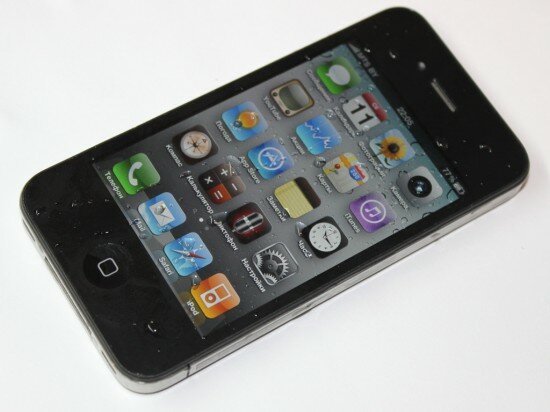
Pic. 20. The iPhone 4 after the test

Pic. 21. Water inside the ear-microphone jack
The grade is 30 from 30 possible
2.9 Dust test
This time, our machine shook the enclosed tray containing the iPhone 4 and dust for 5 minutes. Like in the previous dust test, we did not find much dust in the ear-microphone jack (pic. 22). But when we plugged in the headphones and turned it around (this often happens when a person listens to music while walking or jogging), we heard an unpleasant noise. By the way, dust also penetrated the SIM card slot.

Pic. 22. No dust inside the ear-microphone jack
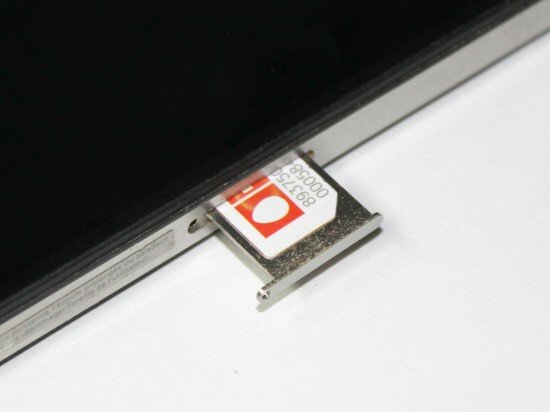
Pic. 23. Dust inside the SIM card slot
The grade is 12 from 12 possible
2.10 Connectivity
We decreased the size of the hole to 20 x 20 mm (0,787 x 0,787 inches). This reduced the signal considerably. In fact, the signal indicator displayed only 2 bars. The signal reception returned to normal soon enough (video 13), thus letting the iPhone 4 receive all calls from then on with no problem.
Video 13. Signal strength test
The grade is 15 from 15 possible
After the 2nd stage of the stress test the iPhone 4 got 230 (from possible 240)
3. Apple iPhone 4 stress test. Stage 3 – The toughest conditions
3.1 Drop test
At the last stage of the stress test, we dropped the iPhone 4 on the carpet from 2 m (6,56 ft) and on the tiles from 1 m (3,28 ft) (video 14, 15). Surprisingly, the gadget survived. However, we noticed that the SIM card connection failed when the phone fell on the tiles. Nonetheless, just a few seconds later, the phone identified the SIM once more. The lower edges of the gadget were also damaged by the fall. To be precise, the matted cover on the corners was rubbed off and the steel band became glazed (pic. 24).

Pic. 24. Damage of the steel band after the fall on the tiles
Video 14. Drop on the carpet from 2 m (6,56 ft)
The grade is 30 from 30 possible
Video 15. Drop on the tiles from 1 m (3,28 ft)
The grade is 20 from 30 possible
3.2 Squeeze test
In this test, we increased the pressure we applied to 20 kg (44 lbs). Despite this high pressure, the phone passed the test successfully. It appears that the iPhone 4 is made of high quality material that can withstand heavy pressure.
The grade is 24 (with 24 being the highest possible grade)
3.3 Bend test
We applied 10 kg (22 lbs) weight in our attempt to bend the iPhone 4. Though very slim, the iPhone 4 had perfect results. «Apple» engineers seem to have managed to make the phone resistant to all possible bends. By the way, bending is one of the most common threats to a gadget. Bending can loosen up the parts of any phone. It can also damage electronic components and even break the phone itself.
The grade is 24 (with 24 being the highest possible grade)
3.4 Durability
In this experiment the drum was rotating for 20 min. and the consequences were worse than in the previous tests. More cracks and scratches appeared on the screen (pic. 25). The screen was considerably damaged – deep scratches spoiled the picture (pic. 26). The back part of the handset suffered even more than the screen. There were a lot of scratches and cracks at the back and at the steel band running round the edges (pic. 27). However the performance of the iPhone 4 was still perfect. The touchscreen, the keys and the loudspeaker functioned with no problem.
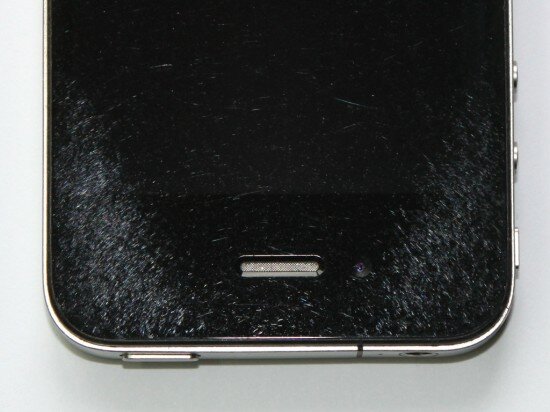
Pic. 25. Damage of the screen

Pic. 26. Defects of the display

Pic. 27. Damage of the back panel
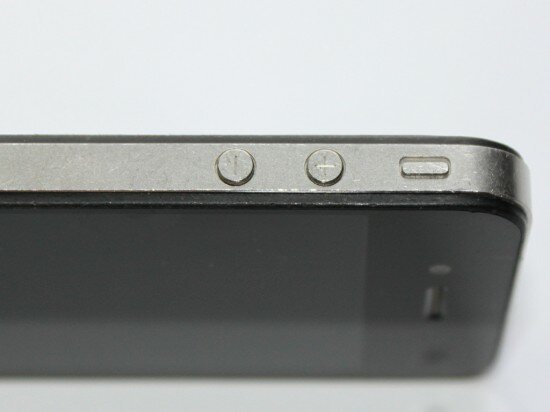
Pic. 28. Damage of the steel band
The grade is 10 from 15 possible
3.5 Scratch test
This time the force of scratches was twice compared to the previous scratch test — 600 g (1,322 lbs). To our surprise, the machine failed to make a scratch on the screen or at the back of the iPhone 4. The phone got a lot of small scratches in the previous tests but there was not any scratch made by the nail. We have never tested a cell phone with such a good touchscreen. We can say that the iPhone 4 is a ruggedized gadget.
15 points (with 15 being the highest possible grade) for the screen
15 points (with 15 being the highest possible grade) for the back cover
3.6 High temperature
We increased the time of this test to 10 min. (video 16). The phone reacted to the heat appropriately. The OS protected the phone. The gadget gave a warning that it is overheating (pic. 29). The color rendering was as good as before the test due to the steel band that absorbed all the heat. The touchscreen performed well. The handset fully survived the high temperature.
Video 16. High temperature test
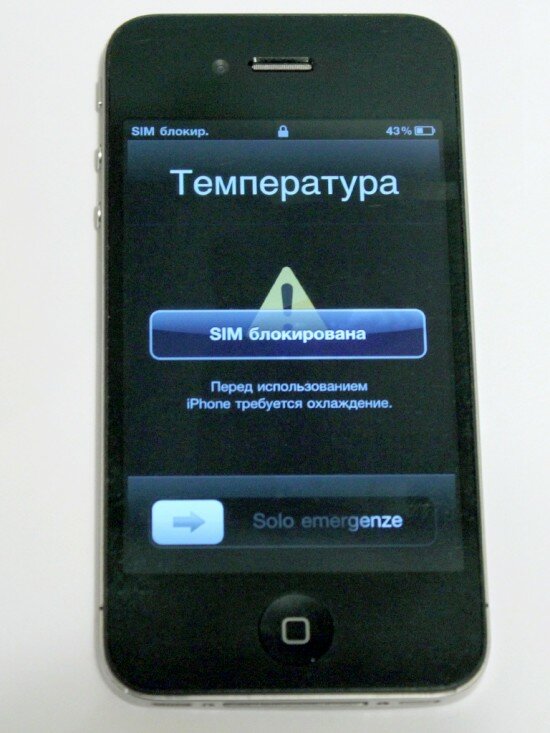
Pic. 29. Warning of overheating
The grade is 12 from 12 possible
3.7 Immersion in water
In this test, we dunked the iPhone 4 under water for 1 sec. (video 17). The result was the same as in the previous test. We dried the gadget and examined it. There was no corrosion at all. All the keys worked. We plugged in the headphones and it functioned well.
Video 17. Immersion in water
The grade is 30 from 30 possible
3.8 Immersion in beer
Now we know that the iPhone 4 is a waterproof device. But what will happen if we drop beer on it? Actually, we dunked it under beer for 10 sec. (video 18). Beer is a much better conductor than water. That is why the display malfunctioned. The beer penetrated the ear-microphone jack and the charger jack. The phone identified the headphones (pic. 30, 31). After this experiment we washed and dried the gadget. Then we switched it on and saw water spots on the display (pic. 32). The beer penetrated deep inside the phone. Nonetheless, the touchscreen performed well.
Video 18. Immersion in beer

Pic. 30. Warning message
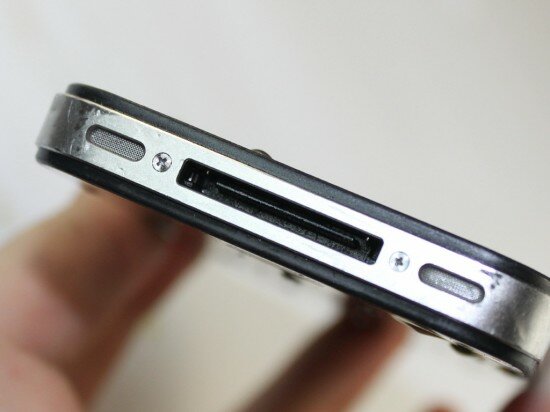
Pic. 31. Drops of beer in the ear-microphone jack and in the charger jack
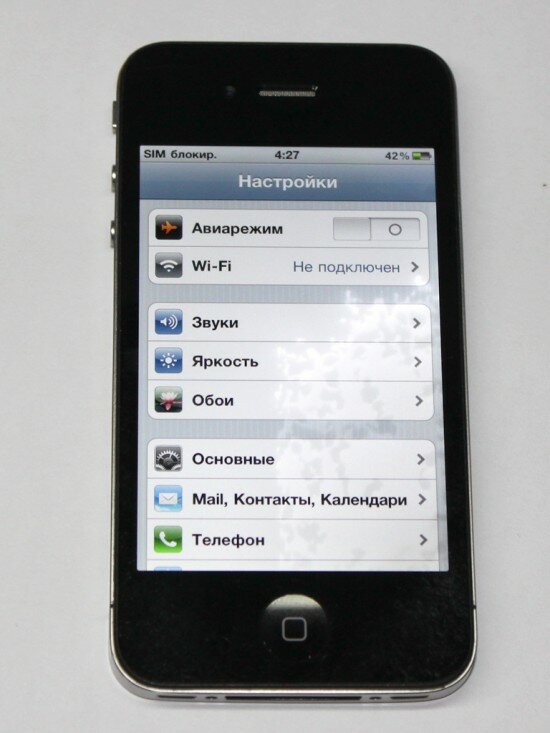
Pic. 32. Spots of beer on the display
The grade is 6 from 9 possible
3.9 Dust test
We increased the time of this test to 10 min. The result was similar to that of the previous dust tests. Though there was not much dust in the loudspeaker (pic. 33), small grains of dust penetrated the protective cover and the loudspeaker produced an unpleasant noise. The vibrate switch started to squeak again (pic. 34). Dust penetrated the camera lens (pic. 35). We wanted to know whether dust penetrated under the back panel so we removed the 2 screws to take off the back cover. We found only the smallest grains of dust under it (pic. 36).

Pic. 33. Dust in the loudspeaker
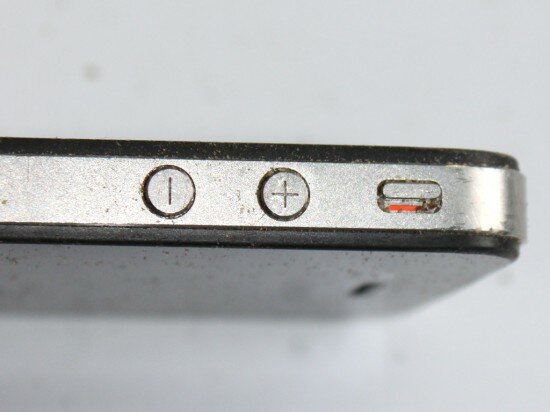
Pic. 34. The vibrate switch is in dust

Pic. 35. Dust under the camera lens
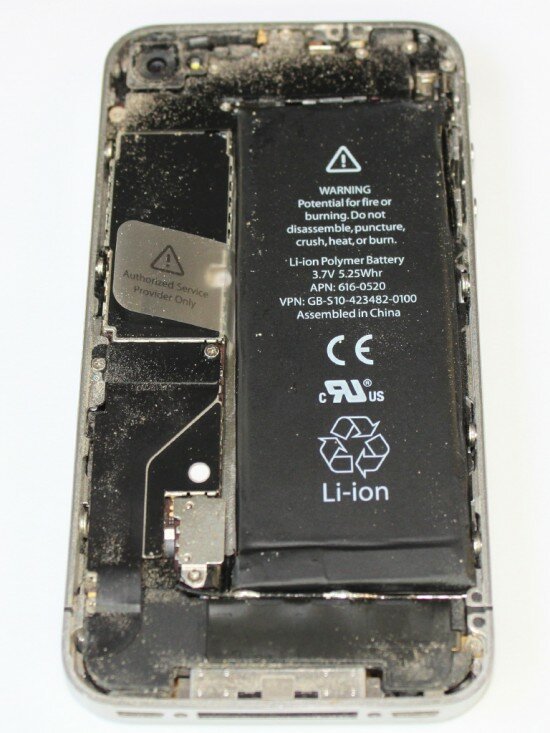
Pic. 36. Dust under the cover
The grade is 8 from 12 possible
3.10 The keypad
There is only one key on the housing faceplate. This key is made of high quality plastic. It is set deep and quite difficult to loosen. The seam between the key and the housing is so small that after all the tests neither dust nor liquid penetrated it. The power and volume buttons are made of steel. They remained absolutely fine. The vibrate switch squeaked all the time when we used it. Nonetheless, it operated with no problem.
The grade is 30 (with 30 being the highest possible grade)
3.11 Connectivity
We decreased the size of the hole in the shielded box to 15 x 15 mm (0,59 x 0,59 inches). The indicator of signal strength displayed only 2 points from a maximum possible signal strength of 5 (video 19). However, the handset received all incoming calls. In comparison with other cell phones that we had tested in our lab, the iPhone 4 passed this test very well.
Video 19. Connectivity test
The grade is 15 from 15 possible
3.12 Short circuit and overcharge
At first we wanted to know what would happen to the battery charger if we made a short circuit of the power supply terminals with the help of the forceps for 1 sec. Watch video 20 to witness how it did not break the battery charger.
Video 20. Short circuit of the battery charger
The grade is 15 from 15 possible
Then we made a short circuit of the battery for 1 sec. (video 21). The battery stayed absolutely safe. After the test, the iPhone 4 performed successfully with this battery inside it.
Video 21. Short circuit of the battery
The grade is 15 from 15 possible
Next, we plugged the battery charger in the PSU and checked the reaction of the gadget to the increase and decrease in charging voltage. We found out that the phone could be charged only within the range of 4,5 V — 6,0 V (video 22). It is a great advantage of the iPhone 4 because it allows us to charge it using USB, in which the voltage of charging is quite different.
Video 22. Changing power supply
The grade is 15 from 15 possible
Finally, we examined the phone’s energy consumption. We took the battery out and plugged the PSU in the phone. A 4-V supply was the starting point. At first, we decreased energy supply until the gadget switched off. Then we increased energy supply until we reached 7 V (video 23).
Like the majority of cell phones, the iPhone 4 switched off when we decreased energy supply to 3 V. Then we switched it on and started increasing energy supply. When we reached 6 V, the gadget’s power consumption started to increase and when we reached 6,5 V, there was a short circuit. Then we tried to switch on the phone (the energy supply was normal) but there was a short circuit again – evidently the circuit board was broken. Unfortunately, we did not manage to identify the real cause of the problem. We were also not able to repair the iPhone 4.
Video 23. Power supply increase
The grade is 0 from 15 possible
3.13 Disassembling
After all the tests, we disassembled the iPhone 4 (pic. 37, 38). We dare say that the quality of build of the phone is very good. There is absolutely no empty space inside the phone. The frame is made of steel which makes the device ruggedized. The steel band makes it difficult to bend the phone. Moreover the steel dissipates the heat which is produced by the processor and the camera. All the components are removable. All of these help find the reason for a possible damage and repair the gadget quickly.
The circuit board is a real masterpiece. It has a very compact design. There are no unnecessary spaces or details. It looks perfectly made (pic. 39). The circuit board contains the 1000 MHz processor, GPS, Wi-Fi, Bluetooth, Flash-memory 16 Gb etc. Some components are specially designed for the L-shaped board. The quality of the assembly is very high. In order to better dissipate heat away from the circuit board, some shields of the board are provided with rubber pads. This is the first time we’ve tested a gadget with such a high quality of build. The Apple iPhone 4 really deserves a lot of praises.

Pic. 37. The back panel removed
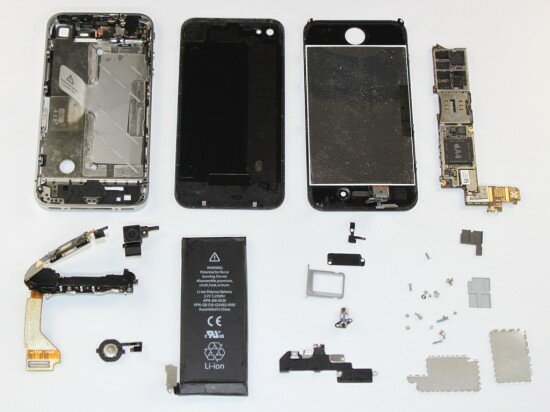
Pic. 38. The iPhone 4 disassembled

Pic. 39. The circuit board
The grade is 30 from 30 possible
After the 3rd stage of the stress test, the iPhone 4 got 314 (with 351 being the highest possible grade)
In spite of the fact that the circuit board of the iPhone 4 was broken, the gadget passed the stress test quite well. The bad results we must mention include the glazed cover which is not durable at all and can be easily scratched. The beer penetrated deep inside the phone and left a lot of spots on the display. But that is pretty much all of what we do not like about it.
Overall, the iPhone 4 passed our stress tests successfully. Very often, it showed the best results among all the gadgets that we had ever tested.
Every detail of the iPhone 4 is designed with punctuality. Even the box is stylish. The iOS warns about all possible problems of the phone. For example, this is the only cell phone that warned about overheating. In our opinion, the device deserves its price.
Here’s how the gadget looks like after all the tests (pic. 40, 41)..
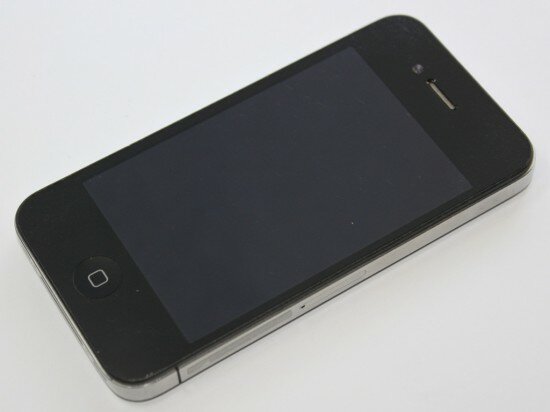
Pic. 40. The front of the iPhone 4 after the test
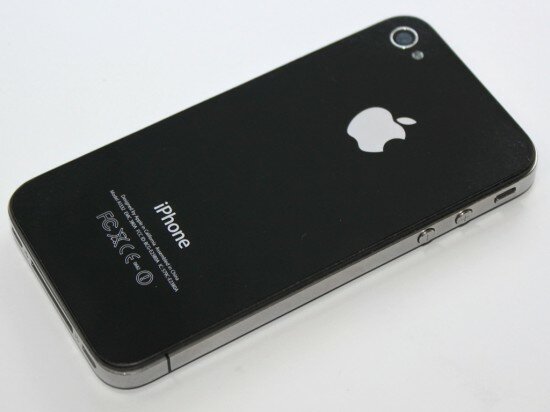
Pic. 41. The back of the iPhone 4 after the test

 Russian version
Russian version
Comments (20)
nice tests – lol
seems i am to afraid to damage my iphone 4 until now
the 10s water test was impressive! (btw. you have written 1s instead of 10s in 3.7 – video 17)
Amazing test!!! proud i have a iphone
my iphone 4 (16GB) unable to surf yahoo / facebook. when i try to sign in, the msg came out :
“Please enable cookies to stay signed in for multiple visits unless you sign out.”
Pls guide me if anyone know how to sovle this problem.
@tanbooi–go to Settings > Safari > Accept Cookies > from visited.
please do the tests with galaxy s and a device with gorilla glass
Pls try Xperia Arc when it is released, it is so thin like an iPhone 4. I’m kinda curious of its quality built. Don’t forget.
How the hell can the phone look like that after the entire tests when there are clear images of the effects after the scratch test? The final images of the iphone show an untouched device. What a marketing scam.
Nice test. I will do the tests again using my newly purchased iPhone4 now!!! Yahooooo
if the gadget is toasted/killed/can’t turned on whatsoever after the test, that means FAILED!
No matter what the outer looks like, but if I can’t use it…that means useless…
I went through the tougher water test video. It was under water for almost 20s. That was amazing! One thing that might not be obvious immediately after the test is that after dropping on tile the internal structure of the front and back cover of the phone might get perturbed and internal stress built up. It may take some time to really observe that the glass gets cracked. I am very curious about what the condition of the screen of the tested phone now.
And tomorrow on the ebay
我想要
I want…how buy? .i from china thanks.
Lol where is the scratch test? And why does it get full score for heat test even though it failed.
Biased mut**fckers. Itards.
I wish I had gone for the Iphone 4 now. I decided to go for a HTC Desire – see how this device performed!!!! It’s so important for a smart phone to be durable. My HTC lasted 2 months before completely dying and I didn’t subject it to any of this. I want a smart phone I can go jogging with or skiing or mountain biking. Forget HTC devices if you wanna do this – they’re only suitable for staying at home on a flat surface!
[url=http://000site.ru/go.php?sid=9][img]http://classsex.ru/sex/279.jpg[/img][/url]
[url=http://000site.ru/go.php?sid=9][img]http://opapizda.com/img/11/index.jpg[/img][/url]
[url=http://000site.ru/go.php?sid=9][img]http://tdq.in/images/1/191.jpg[/img][/url]
bb.txt open error
Can’t you just give me that iPhone instead of destroying it?
Just kidding…
Wow! Great job in doing such an extensive stress test! Maybe you can do a squeeze test by the side of the iphone 4? E.g. Pressing the iPhone 4 down by its side (the antenna). So as to test out the durability of the iPhone 4 if one grips it too tightly:)
HI there!
I barely use my iphon4 16GB and now, i got a problem with its power button even now. It’s hard to press unlike before. The volume button’s working fine and i can press it well and i can feel the click tick sound but the power button is not. I just a help..
My iPhone 4 was washed away by a wave on an Irish beach at 1600 hours and subsequently found when I returned to the spot under 0.5 metre fresh water in the tidal river alongside the site of the loss at 2330. It had spent 5.5 hours under a mixture of salt and fresh water!
It shows no signs of the ordeal and works normally. I find this difficult to believe.
Trackbacks/Pingbacks (8)
[...] you should buy one to prove yourself wrong. See the stress test of the connectivity:- Stress test of Apple iPhone 4 (16 Gb), even in stress testing the phone functioned as it should have been. __________________ The [...]
[...] Jeśli lubicie jak męczą p4 to zobaczcie to: Stress test of Apple iPhone 4 (16 Gb) i kto teraz powie, że ip4 to mięczak Komputer: MBPro/ Samsung QX510 Odtwarzacz: iP4 [...]
[...] iPhone 4 • Nokia N8 [...]
[...] iPhone 4 • Nokia N8 Posted in Nokia, iPhone Tags: iphone 4, nokia & iphone, nokia n8 « O2 UK will offer white Sony Ericsson XPERIA Play exclusively You can leave a response, or trackback from your own site. [...]
[...] algo inevitable, por lo que el día de hoy traemos no una comparación sino una test.Los del sitio Gadgetstrees se dieron a la tarea de someter un iPhone 4 de 16 GB a muchas pruebas. Algunas de las pruebas [...]
[...] Tu jest ciekawy (i momentami wręcz ekstremalny) test wytrzymałości iPhone'a: Stress test of Apple iPhone 4 (16 Gb) Ogólnie w tym teście wypadł naprawdę dobrze. Choć nie chciałbym sprawdzać w praktyce czy [...]
[...] GS AKPC_IDS += "3588,";Popularity: unranked [?] Bookmark on Delicious Digg this post Recommend on [...]
[...] but finally decided to test it despite the fact that it looks absolutely like its antecedent – the iPhone 4 that we reviewed in September 2010. By the way, currently we perform our tests in a little bit different way and even included some [...]